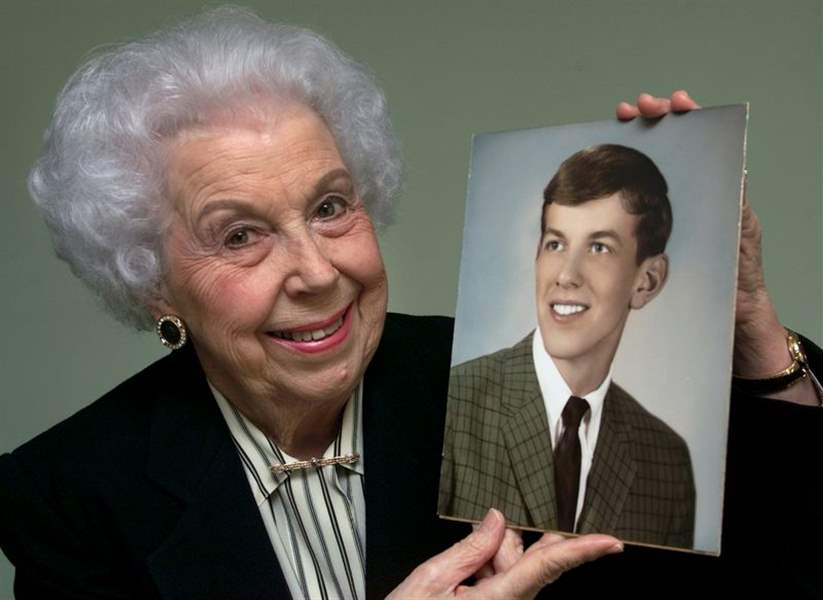
Mom motivated Ward CEO
1/13/2001
Marie Goddu, with her son's high school graduation picture, urged him to move on.
The man in charge of closing 250 Ward department stores nationwide got his early retailing experience in Toledo. And, except for some motherly advice, he might still be working for Seaway Food Town or another grocery chain.
Roger Goddu, 50, chief executive of Montgomery Ward & Co. in Chicago, grew up in Toledo, graduated from St. Clement's school and Central Catholic High School, and attended the University of Toledo and Adrian College.
He became a buyer with the former Lasalle's (Macy's) stores in Toledo while in his early twenties and went on to executive positions with a series of chains, including Target and Toys R Us before, four years ago, taking over leadership of Ward - the chain that will soon end its 128-year run.
It was his mother, Marie, who started him on a fast track - out of groceries and ultimately out of Toledo. She didn't exactly “fire” him, but she gave him some strong encouragement to leave the very company she worked for.

Roger Goddu, 50, chief executive of Montgomery Ward & Co.
Mrs. Goddu, now 80, was an employee-relations worker for Food Town for years, eventually becoming personnel manager. “I said, `Roger, you're not going anywhere here. Let me terminate you,'” she recalled. Plus, she told her son he would have a tough time rising to the top of the grocery chain because a number of sons of Food Town's founders were moving up in the company.
“My suggestion was: `Pick yourself up and go somewhere else.'”
Mr. Goddu now faces the second hardest task in his 30 years of retailing: winding down one of the oldest names in the business and liquidating an estimated $1.8 billion worth of merchandise in a short time. His hardest job, attempting to save Ward, will go uncompleted. The chain, owned by GE Capital, the financing arm of General Electric Co., filed for bankruptcy court protection Dec. 28 and plans to go out of business within months, ending years of staggering losses.
Although some retail analysts gave high marks to improvements initiated by Mr. Goddu, they concluded that the last-ditch effort by GE Capital was too little, too late to put Ward on a plane with Sears, J.C. Penney, and other chains in a crowded field.
Mr. Goddu could not be reached for comment last week. Family members said he has been working 18-hour days recently, setting the agenda for closing the stores and 10 distribution centers, which combined have a total of 28,000 employees. The bankruptcy of the chain, with $3.5 billion in assets, ranked eighth largest nationally last year; the largest was that of Toledo's Owens Corning, with assets of $6.5 billion.
Family, friends, and former classmates characterize Mr. Goddu as bright, witty, sensitive, and hard-working.
He was born in Springfield, Mass., and arrived in Toledo as a toddler, when his father, Vincent - a carpet salesman and territory manager - decided to transfer to the region.
“He has worked since he was 15,” Mrs. Goddu said of her son. “At Food Town, he was a bagger and stocker and worked in produce. He did just about anything,” recalled Mrs. Goddu, who retired 15 years ago from Food Town but worked 10 years more as a part-time office manager for a nursing home.
“Roger was an average student [at Central],”said Joe Braker, a fellow member of the class of '68 and best man in Mr. Goddu's first wedding. “He worked full time all through high school.” Mr. Braker, former president of The Andersons' grain unit, said, “Roger had the most advanced business mentality at the age of 16 of anybody I ever met. He was probably 10 years ahead of anybody else.”
He took responsibility at an early age, remarked Mr. Braker, who now commutes from his Maumee home to his position as senior vice president of Predium, Inc., a start-up dot-com firm that operates a Web-based grain commodities futures exchange in Annapolis, Md.
Mr. Goddu has two grown daughters in Toledo: Sara, an ultrasound diagnostician at Medical College of Ohio, and Samantha, a special-education master's candidate at UT. He also has a grown daughter, Jessica, who runs an education-reform program in Boston, and two daughters, Lauren, 13, and Taylor, 10, at the home he and his second wife, Kate, have in Lake Forest, Ill., a Chicago suburb.
After graduation from Central, Mr. Goddu enrolled at Adrian College in Michigan but soon transferred to UT, in 1969, partly to help his parents while his father recuperated from a serious injury. The elder Mr. Goddu had been robbed and shot while on a business trip in Atlanta.
“This was obviously a difficult time,” said Roger's sister, Diane Ruiz. Her brother, she said, “jumped in to help my father, a very stoic New Englander.”
Mrs. Ruiz, a Spanish teacher at St. Joseph School in Sylvania and former associate principal at Whitmer High School, said, “My brother is a very sensitive, caring man, very quick-witted and very independent, always able to make good decisions. He does not fit the mold of what you think of as a big-business [executive].”
While attending UT at night for two years, taking business courses, Mr. Goddu held several jobs after his mother talked him out of staying at Food Town. Things clicked for him at Lasalle's, where he quickly became a buyer for candy, cosmetics, and the budget store.
By 1975, he had become vice president of Rike's/Lazarus Department Stores in Dayton, and five years later he became senior vice president of the Target Stores division of Dayton Hudson Corp. in Minneapolis - where he developed a private-label program. In 1989 he was lured away by Toys R Us in Paramus, N.J., where he was first executive vice president and, in 1996, was promoted to president, U.S. merchandising.
GE Capital recruited him in late 1996 to try to turn Montgomery Ward around. At the time, Mr. Goddu called Ward “an American institution.”
For 55 years, Ward had been a public company before it was bought by Mobil, Inc., in the mid-1970s. The chain - which gave the character Rudolph the Red-Nosed Reindeer to the world - was acquired by GE Capital through a leveraged buyout in 1988.
By the time Mr. Goddu took over, Ward, with 400 stores, was in serious trouble, bleeding red ink. It lost $237 million in 1996.
Mr. Goddu closed more than 100 underperforming stores in his first year and began revamping 40 stores - redesigned around oval “racetrack” formats to enhance browsing, with brighter lighting, trendier merchandise, greater sales area, additional clerks, and beefed-up advertising, including in recent years baseball slugger Sammy Sosa “pitching” for Ward.
Some industry analysts applauded the changes and Mr. Goddu's ability to squeeze more funds out of GE Capital. Sales rose 40 percent in the revitalized stores. In a company news release in 1998, Mr. Goddu promised that “Ward's is creating a store for the next millennium by providing today's time-crunched shoppers with an experience that is both enjoyable and efficient.”
However, the losses continued, hitting $1.1 billion in 1997, during which the privately held company filed its first Chapter 11 bankruptcy (it emerged in 1999). In fiscal 1998, the last year it reported financial results, Ward lost $971 million on sales of $3.6 billion, down 20 percent from the previous year.
In a statement the day of the latest bankruptcy filing, Mr. Goddu said it came only after “an exhaustive exploration of options for continuing the business. ... Sadly, today's action is unavoidable.”
“Ward's was kept alive because GE Capital didn't want to pull the plug,” said Kurt Barnard, president of Barnard's Retail Trend Report in Upper Montclair, N.J. “It didn't want the black eye.” Mr. Barnard said Mr. Goddu probably did what he could with the situation “but it was doomed from the beginning.”
Gary Wright, who owns G.A. Wright Marketing, Inc., a retail consulting firm in Denver, said: “My guess is they just had some insurmountable obstacles. Ward's had a very difficult market niche. Discounters beat them on the price end. Full-line department stores do a better job in clothes. It's difficult for Sears, difficult for J.C. Penney. It's just a format that's seen its day.”
The company has permission from the bankruptcy court in Delaware to begin its going-out-of-business sales, which are offering merchandise at up to 40 percent off.
Ward plans to sell about 100 store sites and terminate leases on 150 others, including its two in Toledo, at North Towne Square Mall and at Southwyck Shopping Center. The move will leave North Towne without an anchor. Ward's closing also is costing Monroe's La-Z-Boy, Inc., an estimated $20 million worth of business, about 1 per cent of the furniture firm's annual sales.
“I wish he had been given more time,” Mr. Goddu's sister, Mrs. Ruiz, said. As for the future, “I have confidence he will be fine.”
“I think he plans to take a little bit of a rest,” said his wife, Kate. “He'd like to be involved in running a business again, but it doesn't necessarily have to be a retail business.”